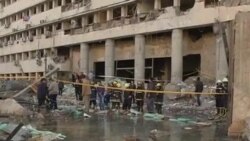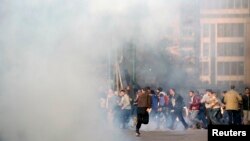CAIRO —
Police and security forces in Egypt -- reeling from a string of deadly violence Friday -- are bracing for more trouble Saturday, as the country marks the third anniversary of the uprising that toppled autocrat Hosni Mubarak.
At least 20 people died Friday across Egypt, including at least six police killed in Cairo. Authorities say the remaining deaths occurred in clashes among Islamist protesters, their secular opponents and police. Thousands from the same rival groups are expected to rally Saturday in Cairo, as well as in other major cities.
The 2011 Arab Spring uprising that swept through large parts of the Middle East raised hopes in Egypt for a stable democracy in the Arab world's largest nation. Instead, the country has been mired in political turmoil, as Islamist backers of ousted president Mohamed Morsi battle to regain control of the country from the military-backed government that drove him from power.
At least four blasts Friday rattled Cairo, including a suicide car bombing near a security compound.
There were no immediate claims of responsibility, although Islamist militants have been blamed for a number of such attacks since the military ousted the Morsi government and arrested the former president last July.
A spokesman for interim President Adly Mansour condemned the violence. He said “such terrorist operations that seek to break the will of Egyptians” will only unify them.
Meanwhile, supporters of ousted President Mohamed Morsi and the outlawed Muslim Brotherhood clashed with security forces and civilians during protests in several cities on Friday. Officials said at least 10 people died in that unrest.
The violence came one day before the nation marks the third anniversary of the uprising against longtime leader Hosni Mubarak, which began on National Police Day.
Following the explosions Friday, Egyptian media reported that authorities plan to block Tahrir Square through Sunday. Opposition groups, both secular activists and the Muslim Brotherhood, had said they were planning peaceful protests to mark the anniversary.
Divisions have deepened over the possibility that the next president could be another military strongman, de-facto leader General Abdel Fatah el Sissi. Security was on high alert even before the blasts.
There was no immediate claim of responsibility for the attacks. There were unconfirmed reports that the jihadist group Ansar Beit al Maqdis, which derides the Brotherhood for lack of militancy, had sent a warning to officials before the blasts occurred..
The Sinai-based militants have claimed responsibility for other attacks in recent months, including a failed assassination attempt on the nation's interior minister and the bombing of a police station in the Nile Delta that left 16 people dead.
Ansar Beit al Maqdis is among several jihadi groups who have escalated attacks against security and military targets since the ouster of President Mohamed Morsi last year.
Public suspicion immediately fell on Morsi's Muslim Brotherhood, with crowds chanting death to the group outside police headquarters. The building was heavily damaged by the blast, as was the Museum of Islamic Art across the street.
The Brotherhood has denounced previous such attacks, but the government blamed them for the Nile Delta bombing, and declared the group a terrorist organization.
Little hard evidence has been presented to link the Brotherhood and the jihadists.
At least 20 people died Friday across Egypt, including at least six police killed in Cairo. Authorities say the remaining deaths occurred in clashes among Islamist protesters, their secular opponents and police. Thousands from the same rival groups are expected to rally Saturday in Cairo, as well as in other major cities.
The 2011 Arab Spring uprising that swept through large parts of the Middle East raised hopes in Egypt for a stable democracy in the Arab world's largest nation. Instead, the country has been mired in political turmoil, as Islamist backers of ousted president Mohamed Morsi battle to regain control of the country from the military-backed government that drove him from power.
At least four blasts Friday rattled Cairo, including a suicide car bombing near a security compound.
There were no immediate claims of responsibility, although Islamist militants have been blamed for a number of such attacks since the military ousted the Morsi government and arrested the former president last July.
A spokesman for interim President Adly Mansour condemned the violence. He said “such terrorist operations that seek to break the will of Egyptians” will only unify them.
Meanwhile, supporters of ousted President Mohamed Morsi and the outlawed Muslim Brotherhood clashed with security forces and civilians during protests in several cities on Friday. Officials said at least 10 people died in that unrest.
The violence came one day before the nation marks the third anniversary of the uprising against longtime leader Hosni Mubarak, which began on National Police Day.
Following the explosions Friday, Egyptian media reported that authorities plan to block Tahrir Square through Sunday. Opposition groups, both secular activists and the Muslim Brotherhood, had said they were planning peaceful protests to mark the anniversary.
Divisions have deepened over the possibility that the next president could be another military strongman, de-facto leader General Abdel Fatah el Sissi. Security was on high alert even before the blasts.
There was no immediate claim of responsibility for the attacks. There were unconfirmed reports that the jihadist group Ansar Beit al Maqdis, which derides the Brotherhood for lack of militancy, had sent a warning to officials before the blasts occurred..
The Sinai-based militants have claimed responsibility for other attacks in recent months, including a failed assassination attempt on the nation's interior minister and the bombing of a police station in the Nile Delta that left 16 people dead.
Ansar Beit al Maqdis is among several jihadi groups who have escalated attacks against security and military targets since the ouster of President Mohamed Morsi last year.
Public suspicion immediately fell on Morsi's Muslim Brotherhood, with crowds chanting death to the group outside police headquarters. The building was heavily damaged by the blast, as was the Museum of Islamic Art across the street.
The Brotherhood has denounced previous such attacks, but the government blamed them for the Nile Delta bombing, and declared the group a terrorist organization.
Little hard evidence has been presented to link the Brotherhood and the jihadists.






